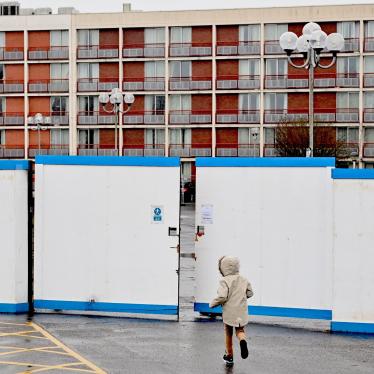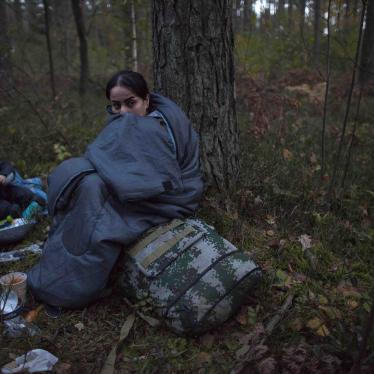(Bishkek) –An Uzbek refugee has been missing from Kyrgyzstan’s capital, Bishkek, since February 18, 2013. Another asylum seeker from Uzbekistan is in custody while he contests an extradition order issued by the Kyrgyz authorities in violation of international law.
“Kyrgyzstan has a poor record of protecting Uzbek refugees and asylum seekers who flee religious and other persecution in neighboring Uzbekistan,” said Mihra Rittmann, Central Asia researcher at Human Rights Watch. “Kyrgyz authorities are responsible for the safety and security of refugees and asylum seekers on its territory – including not returning them to places where they might face torture and persecution, and protecting them from enforced disappearance in Kyrgyzstan.”
The Uzbek refugee, Shukhrat Musin, received a call on his mobile phone at about midday on February 18 at his apartment in Bishkek and then went out, a family member told Human Rights Watch. Musin has not returned home or answered calls to his mobile phone.
His wife filed a missing persons report with the police in Bishkek on February 19. Kyrgyz authorities are investigating the disappearance according to information received by Human Rights Watch, but a week later, they appear to have made little progress. Authorities have denied that Musin is in their custody, prompting fears he is being held incommunicado or has been forcibly returned to Uzbekistan.
Musin is from Khanabad, a city in eastern Uzbekistan not far from Andijan, where Uzbek security forces killed hundreds of civilians on May 13, 2005, after an armed uprising. Musin and other members of his family fled Uzbekistan in 2008, fearing religious persecution, his family told Human Rights Watch. Musin was recognized as a refugee by the Office of the United Nations High Commissioner for Refugees (UNHCR) in mid-2009, and has been living in Bishkek with his family awaiting third-country resettlement.
Since he was recognized as a refugee, however, Musin has faced harassment by local authorities. In early October 2010, for example, agents from the Kyrgyz State Committee on National Security (GKNB) detained Musin following an extradition request by Uzbek authorities. Musin is wanted in Uzbekistan for multiple alleged crimes including terrorism, attempting to overthrow the constitutional order, and participating in a religious extremist organization. Musin was held in GKNB detention for approximately four months and was only released in February 2011 after the Kyrgyzstan Prosecutor General’s Office declined Uzbekistan’s extradition request, on the grounds that he had been granted UNHCR refugee status.
In December 2011, Musin was again detained by security agents, but was released after several hours, a family member told Human Rights Watch.
“Kyrgyzstan has a responsibility to protect all refugees on their territory and to hold accountable anyone who is responsible for Musin’s disappearance,” Rittmann said. “The authorities should redouble their efforts to find out what happened to him, and do everything in their power to bring Musin safely home to his family.”
In a separate, ongoing case, another Uzbek asylum seeker, Khabibullo Sulaimanov, is contesting an extradition order issued by the Prosecutor General’s Office in November 2012 despite Kyrgyzstan’s responsibilities under international law and the prohibition on torture. The Bishkek City Court is scheduled to continue a hearing on his case on March 1.
Sulaimanov’s lawyer, Toktogul Abdyev, appealed to President Almazbek Atambaev on February 20 to intervene in this case. International organizations, including Human Rights Watch and the Organization for Security and Cooperation in Europe (OSCE), had previously sent letters to the Kyrgyz authorities urging them to adhere to their international obligation not to return people to countries where they face the threat of torture.
Human Rights Watch fears that if either Musin or Sulaimanov is returned to Uzbekistan, they are at grave risk of torture and ill-treatment, which are widespread and systematic in Uzbekistan’s criminal justice system. Human Rights Watch has found that people held on religious-extremism-related charges are often subjected to especially harsh ill-treatment.
Forcible returns to countries where there is a risk of torture or other inhuman and degrading treatment violate Kyrgyzstan's obligations under article 3 of the Convention against Torture and Other Cruel, Inhuman or Degrading Treatment or Punishment, which it ratified in 1997. It would also violate Kyrgyzstan’s obligations as a party to the 1951 Refugee Convention to return asylum seekers to a place where they faced persecution.
More than a dozen asylum seekers have been forcibly returned from Kyrgyzstan to Uzbekistan since 2005. There have been serious allegations that the Kyrgyz authorities have provided details about Uzbek asylum seekers, including their names and addresses, to the Uzbek government.
In August 2006, the Kyrgyz government violated international law by forcibly returning five Uzbeks to Uzbekistan. The UNHCR had granted refugee status to four of them, and the fifth had been registered as an asylum seeker. Another five registered asylum seekers disappeared from Osh, a city in southern Kyrgyzstan, over the following two weeks.
In May 2008, Kyrgyz authorities handed over Erkin Holikov to Uzbek authorities despite his pending asylum claim. And in September 2008, Haiotjon Juraboev, an Uzbek national who had been granted refugee status by the UNHCR, was abducted in Bishkek by a man claiming to be a Kyrgyz national security agent. In February 2009, Juraboev was sentenced to a 13-year prison term in Uzbekistan.
The Kyrgyz government should immediately and fully investigate Musin’s disappearance and be particularly vigilant about stopping any attempts of foreign agents to abduct and surreptitiously transport him to Uzbekistan, Human Rights Watch said. The Prosecutor General’s Office should withdraw the order for Sulaimanov’s extradition and release him, pending review of his asylum claim.
The United Nations, the European Union, and the United States should also call upon the Kyrgyz government to protect refugees and asylum seekers within Kyrgyzstan’s borders, Human Rights Watch said.
Given the ongoing threat of forced return from Kyrgyzstan to Uzbekistan, the UNHCR should expedite the review of any outstanding refugee claims by Uzbek nationals and expedite their resettlement to safe, third countries.





